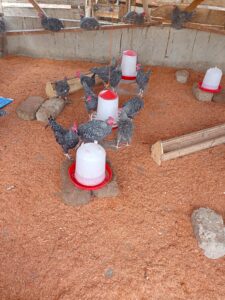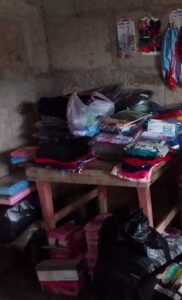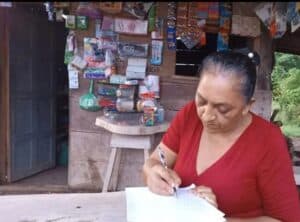
Tijani Increases Yield in Ghana

TIJANI INCREASED YIELD THROUGH THE ADOPTION OF IMPROVED FARMING TECHNOLOGIES AND AGRONOMIC PRACTICES.
By Emmanuel Obiri Laryea – Agriculture & Entrepreneurship Program Officer
Self-Help International operates in the mostly rural Ashanti region of Ghana where a high proportion of households consist of farmers who are dependent on agriculture as a primary source of food and livelihood. Productivity in the rural areas is very low due to a number of factors including: unpredictable rainfall patterns; farmers opting for less expensive inputs instead of investing in higher quality supplies; and poor technological resources.
Amidst all these hardships faced by farmers as they strive for prosperity, a farmer named Tijani is making headway to turn things around for the better by adopting improved farming technologies and agronomic practices.
Tijani is a 49-year-old farmer who lives with his family in the village of Fankamawe, he started working with Self-Help International in 2018. As part of the intake process, Self-Help did a needs assessment with Tijani to identify his challenges and knowledge gaps before conducting trainings to address those gaps. Among the identified gaps were: record keeping; lack of access to quality inputs; little education on crop disease and pest management; not practicing conservation agriculture; and little knowledge of improved farming technologies and agronomic practices.
Self-Help worked with Tijani through a series of trainings involving classroom work, field visits, and hands-on training related to the gaps he identified with Self-Help. Initially, Tijani was hesitant to adopt some of the new practices, especially those relating to improved farming methods and inputs such as using a recommended seed rate of 9 kg/acre (20lb/acre); using higher quality maize seed varieties; treating seed before sowing; planting the seed in rows with a recommended spacing of 80 cm x 40 cm (31 in x 16 in); applying fertilizer; managing crop diseases and pests; and timely harvesting.
Tijani finally agreed to adopt these practices when he witnessed the results of the harvest recorded by the training center. He was linked to the Planting for Food and Jobs package, an initiative by the government of Ghana to supply inputs to farmers at subsidized prices. Self-Help assisted Tijani with marking his row lines and guided him through the planting of his seed and all of the other farming activities through constant visits to his farm and his home.
Upon harvesting his maize, Tijani recorded a yield of 22 bags at 120 kg per bag (264 lbs) on his four acre land, which was a great improvement on his previous yield of 12 bags. Tijani donated some of his maize to support Self-Help’s school feeding program in his community.
The price of maize depreciated to 150 Ghanaian Cedi per bag (around $30 USD) at the time Tijani harvested his maize. This worried Tijani because, when he looked at the money he had invested and the price of maize at that time, he would have only made a little bit of a profit. Self-Help introduced Tijani to the use of Purdue Improved Crop Storage (PICS) sacs, hermetically sealed crop storage bags that allow for longer and safer storage of grains so that farmers can sell it when prices appreciates. Tijani managed to purchase 15 PICS sacs through Self-Help to store some of his maize until he could sell it when the price increased again. He is now happy and has placed additional orders for PICS sacs for his minor season maize, which he has yet to harvest.
Tijani shook the hand of Self-Help’s Agriculture and Entrepreneurship Program Officer, Emmanuel, and said with a smile on his face, “Thanks to Self-Help International for all the support over the years and may God bless and strengthen you to continue this good work.”

 Previous Post
Previous Post Next Post
Next Post


